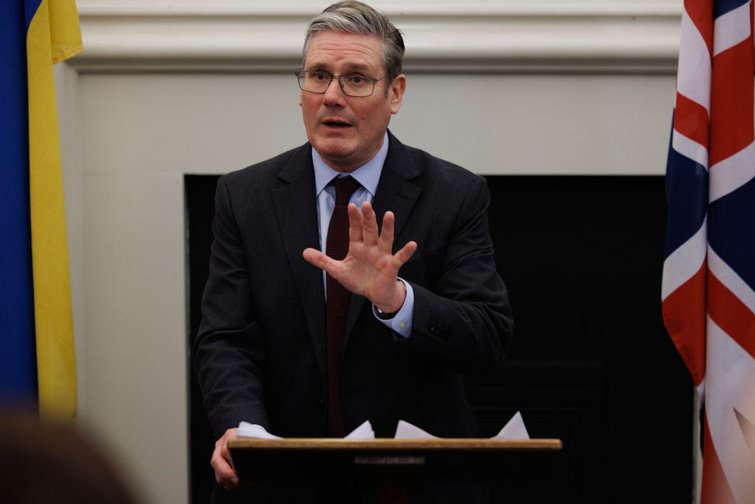
The Labour Party has more influence over a ceasefire in Gaza than it claims
Posted: 4th March 2024
Share this story
This now looks increasingly improbable. There are further disagreements between Hamas and Israel over the release of hostages held by Hamas and Israeli prime minister Binyamin Netanyahu is continuing to wage war on Gaza.
But, curiously, a halt on the fighting could become more likely if it were backed by the British Labour Party, which has so far refrained from being overly critical of Israel.
Netanyahu has been consistent with his goal from the start, making clear he wants to achieve the complete destruction of Hamas, regardless of the devastating consequences for Palestinians.
More than 30,000 people have been killed in Gaza, including 11,000 children, according to the Palestinian health ministry. Up to 5,000 more are presumed dead, with many buried under rubble, and a further 70,000 have been injured, many maimed for life.
The US has more power to force a ceasefire than any other country, just as Ronald Reagan did during the 1982 Israeli siege of Beirut.
While Biden has been critical of the spiralling death toll in Gaza, he has so far been reluctant to demand an end to Israel’s attacks. The actions of the Labour Party in the UK could be what changes his mind.
The UK typically views itself as a much more significant partner to the United States than it really is, but this is one of the few occasions when British influence could matter, particularly as the UK has backed the US in several wars in the past two decades.
Washington sees Labour as the government-in-waiting, meaning it values the party’s policy on Israel, especially when many other European states are deeply critical of Netanyahu.
Labour’s leader, Keir Starmer, has so far echoed the UK government line, including supporting the continuation of arms sales to Israel. Pressure is mounting for him to change his position, though, not least with the election last week of former Labour MP George Galloway, who made support for Palestine a key part of his campaign in the Rochdale by-election.
A change in policy could perhaps be made easier by the fact that the US has seemingly already taken issue with Israel’s use of the Dahiya military doctrine, an Israeli war strategy named after a neighbourhood of Beirut that was a Hezbollah stronghold until it was destroyed almost completely during Israel’s 2006 assault on Lebanon.
The doctrine, which follows that costly insurgencies are dealt with by the extensive and disproportionate use of military force against entire populations, has already been used to inflict terrible suffering in Gaza in the current disastrous conflict.
Keep openDemocracy free for everybody
We’re a small non-profit journalism outfit, not funded by dark money or lucrative sponsorship, so we depend on regular donations from our readers to keep our work free for everyone.
Please support independent non-profit journalism by donating today.
Aside from the high death toll, recent months have also seen the forced migrations of many hundreds of thousands of people, fuel and electricity being cut off, and severe food shortages leading to malnutrition and starvation. Clean water is scarce, toilet facilities are grossly overcrowded, medical supplies are minimal, and schools, hospitals and health centres are being targeted by the IDF.
Yet Netanyahu has made clear that he intends to go further still, even attempting to block the distribution of what little aid makes it into the territory.
Despite the Israeli prime minister’s insistence that Hamas is near defeat, militants from the group have returned to northern Gaza, where they are “rebuilding a system of governance”, according to The Guardian.
In trying to re-establish some order in the area, which has been very badly hit by a lack of food and medical help, Hamas-run police officers have been helping to prevent the looting of the few aid lorries still arriving.
IDF units have begun attacking the police as they do so – sparking criticism from the US, with the American news website Axios reporting that the Biden administration has asked Israel to “stop targeting” the police force “who escort aid trucks” and warned that a “total breakdown of law and order” is worsening the humanitarian crisis in the Gaza Strip.
The Israeli argument is that any police in Gaza are inevitably supporters of Hamas, and it intends to completely eradicate the group. If this means targeting aid deliveries, so be it.
It is worth noting that this plan will not work. Hamas will be weakened further if the war continues and may end up a shadow of its former self in Gaza, but its existence will not disappear. Its popularity across the occupied West Bank will probably increase further and tens of thousands of young Palestinians will be recruited to further conflict in the coming years.
The credibility of Israel’s security will also not recover and the trauma of Hamas’ attacks on 7 October will not lessen, while international support for the Palestinian cause will increase and Israel will face losing its international legitimacy.
The Biden administration appears to understand this and object to Israel’s pursuit of the Dahiya doctrine. If Labour were to change its policy and demand a ceasefire – backed by a threat to withdraw that support for Israel – it could be the factor that finally encourages the US president to call a halt.

